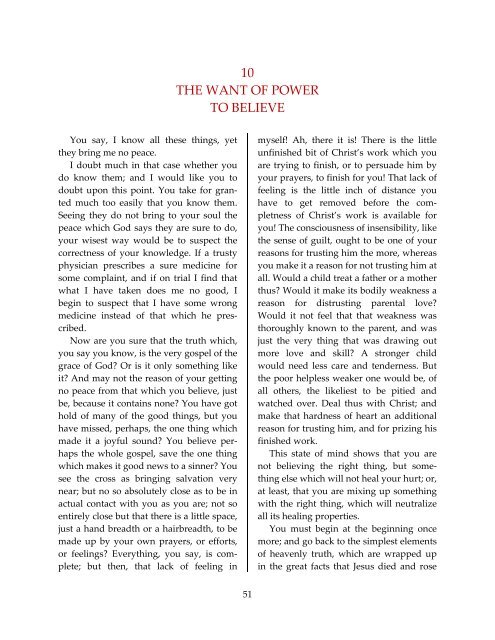God's Way of Peace by Horatius Bonar, D.D.
The seasoned Scottish pastor wrote this short devotional for those suffering from guilt, anxiety, or the consequences of sin. He writes with neither chastisement nor condemnation, but rather immediately directs his readers to Christ’s gift of salvation through his death and resurrection. Bonar reminds all that the Gospel offers hope for the sinner and comfort for the troubled, for God’s perfect, constant grace never fails those who accept it. From Bonar’s time to the present, people have found peace with God afresh through this book. Many people report having read it several times, and turning to it again and again when troubles arise. Kathleen O’Bannon CCEL Staff
The seasoned Scottish pastor wrote this short devotional for those suffering from guilt, anxiety, or the consequences of sin. He writes with neither chastisement nor condemnation, but rather immediately directs his readers to Christ’s gift of salvation through his death and resurrection. Bonar reminds all that the Gospel offers hope for the sinner and comfort for the troubled, for God’s perfect, constant grace never fails those who accept it. From Bonar’s time to the present, people have found peace with God afresh through this book. Many people report having read it several times, and turning to it again and again when troubles arise.
Kathleen O’Bannon
CCEL Staff
Create successful ePaper yourself
Turn your PDF publications into a flip-book with our unique Google optimized e-Paper software.
GOD’S WAY OF PEACE<br />
10<br />
THE WANT OF POWER<br />
TO BELIEVE<br />
You say, I know all these things, yet<br />
they bring me no peace.<br />
I doubt much in that case whether you<br />
do know them; and I would like you to<br />
doubt upon this point. You take for granted<br />
much too easily that you know them.<br />
Seeing they do not bring to your soul the<br />
peace which God says they are sure to do,<br />
your wisest way would be to suspect the<br />
correctness <strong>of</strong> your knowledge. If a trusty<br />
physician prescribes a sure medicine for<br />
some complaint, and if on trial I find that<br />
what I have taken does me no good, I<br />
begin to suspect that I have some wrong<br />
medicine instead <strong>of</strong> that which he prescribed.<br />
Now are you sure that the truth which,<br />
you say you know, is the very gospel <strong>of</strong> the<br />
grace <strong>of</strong> God? Or is it only something like<br />
it? And may not the reason <strong>of</strong> your getting<br />
no peace from that which you believe, just<br />
be, because it contains none? You have got<br />
hold <strong>of</strong> many <strong>of</strong> the good things, but you<br />
have missed, perhaps, the one thing which<br />
made it a joyful sound? You believe perhaps<br />
the whole gospel, save the one thing<br />
which makes it good news to a sinner? You<br />
see the cross as bringing salvation very<br />
near; but no so absolutely close as to be in<br />
actual contact with you as you are; not so<br />
entirely close but that there is a little space,<br />
just a hand breadth or a hairbreadth, to be<br />
made up <strong>by</strong> your own prayers, or efforts,<br />
or feelings? Everything, you say, is complete;<br />
but then, that lack <strong>of</strong> feeling in<br />
myself! Ah, there it is! There is the little<br />
unfinished bit <strong>of</strong> Christ’s work which you<br />
are trying to finish, or to persuade him <strong>by</strong><br />
your prayers, to finish for you! That lack <strong>of</strong><br />
feeling is the little inch <strong>of</strong> distance you<br />
have to get removed before the completness<br />
<strong>of</strong> Christ’s work is available for<br />
you! The consciousness <strong>of</strong> insensibility, like<br />
the sense <strong>of</strong> guilt, ought to be one <strong>of</strong> your<br />
reasons for trusting him the more, whereas<br />
you make it a reason for not trusting him at<br />
all. Would a child treat a father or a mother<br />
thus? Would it make its bodily weakness a<br />
reason for distrusting parental love?<br />
Would it not feel that that weakness was<br />
thoroughly known to the parent, and was<br />
just the very thing that was drawing out<br />
more love and skill? A stronger child<br />
would need less care and tenderness. But<br />
the poor helpless weaker one would be, <strong>of</strong><br />
all others, the likeliest to be pitied and<br />
watched over. Deal thus with Christ; and<br />
make that hardness <strong>of</strong> heart an additional<br />
reason for trusting him, and for prizing his<br />
finished work.<br />
This state <strong>of</strong> mind shows that you are<br />
not believing the right thing, but something<br />
else which will not heal your hurt; or,<br />
at least, that you are mixing up something<br />
with the right thing, which will neutralize<br />
all its healing properties.<br />
You must begin at the beginning once<br />
more; and go back to the simplest elements<br />
<strong>of</strong> heavenly truth, which are wrapped up<br />
in the great facts that Jesus died and rose<br />
51

















